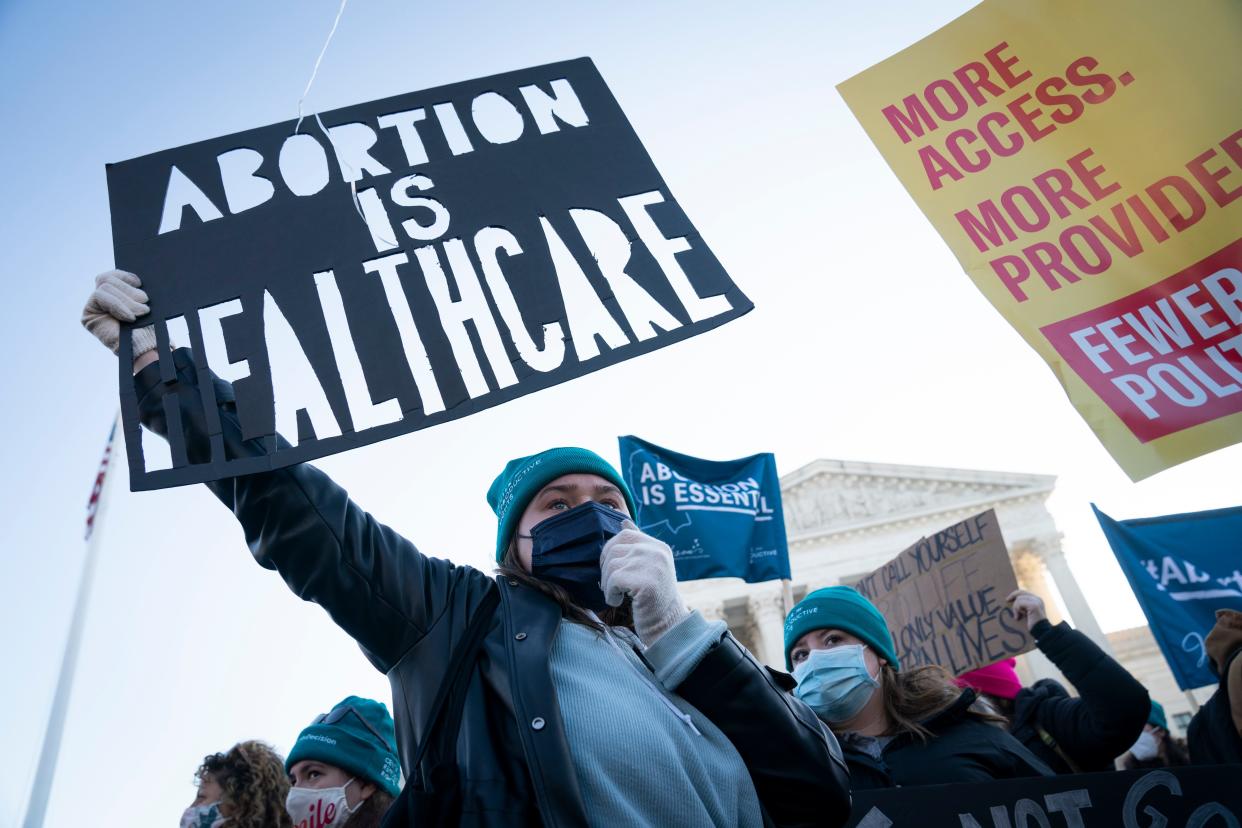Mississippi's history of terrorizing Black women continues unabated in abortion ban case

At last week's oral argument in Dobbs v. Jackson Women’s Health Organization, the state of Mississippi pressed the Supreme Court to overturn Roe v. Wade. Roe held that women’s right to terminate pregnancy prior to fetal viability is a component of liberty protected by the Due Process Clause of the Fourteenth Amendment.
Echoing a line of questioning from Justice Samuel Alito, Mississippi’s Solicitor General ended his argument by comparing the abrogation of Roe with the overturning of the “separate but equal” doctrine in Brown v. Board of Education.
This is a vile analogy and a shocking mischaracterization of history. For centuries, state governments – including Mississippi – permitted and facilitated brutal regulation of Black women’s reproductive functions. Mississippi’s attempt to overturn Roe so that it may outlaw abortion is just the latest incarnation of state efforts to deny Black women’s bodily autonomy.
A history against Black women's rights
At the time of their arrival on American shores more than four centuries ago, enslaved Black women were regarded as mere property of the white men who owned them. Those men took a special and perverse interest in Black women’s reproductive abilities. After Congress banned the importation of slaves in 1808, that interest became economic as well, with Black women forced, through prolific rape and “breeding,” to physically propagate the evil of slavery.
The law offered no protection for Black women. Louisiana, for instance, excluded Black women from its criminal prohibition on rape. A Mississippi court dismissed an indictment against a man charged with raping a Black girl under 10 years old because “the crime of rape does not exist in this state between African slaves.”

And when enslaved Black women became pregnant, they had no legal claim to their children. One of the New World’s early statutes, adopted by the Virginia colony in 1662, made all children of enslaved Black women the property of their masters by operation of law.
Lila Rose: Science proves Roe v. Wade wrong. Humanity doesn't start at 20 weeks: Lila Rose
The denial of Black women’s humanity left them open to untold horrors even outside of slave plantations. The father of American gynecology and racist J. Marion Sims perfected his revolutionary techniques through the involuntary, unanesthetized slicing and suturing of Black women’s genitalia. Circus legend P.T. Barnum started his career by leasing and displaying an elderly Black woman. Death brought no sanctuary for the bodies of Black women. Their bodies were dissected and reproductive organs displayed as curiosities and entertainment for the white public.
Sexual terrorism against Black women
The end of slavery did not liberate Black women from sexual violence. White men determined to “redeem” the Confederacy employed the rape of Black women as a tool to thwart political, economic, and social advances by newly freed Black people. Ida B. Wells declared in 1892 that “the rape of helpless Negro girls, which began in slavery days, still continues without reproof from church, state, or press.” Sexual terrorism against Black women continued unabated through the years of Jim Crow in the South and served as a motivation for the Civil Rights Movement of the 1950s and 60s.
Suzette Hackney: We condemn from afar but where's the empathy when it comes to abortion?
The turn of the 20th century introduced a new nightmare: compulsory surgical sterilization. Indiana passed the nation’s first law providing for the forcible sterilization of “the mentally unfit” in 1907. The Supreme Court endorsed the practice in 1927, declaring it “better for all the world, if instead of waiting to execute degenerate offspring for crime, or to let them starve for their imbecility, society can prevent those who are manifestly unfit from continuing their kind.” With the Court’s blessing, by 1935, 27 states mandated sterilization of the feebleminded, those on welfare, or those with genetic defects. Black women have always been overrepresented in sterilizations.
In Mississippi, surgical sterilization of Black women without their consent was so common that it earned its own name—the “Mississippi appendectomy.” Black freedom fighter and Mississippi native Fannie Lou Hamer, herself a victim of involuntary sterilization, once declared that “a Black woman’s body was never hers alone.”
Still, Black women resist
This history demonstrates that while the specific means have varied – from forced procreation during slavery to forced sterilization in the 20th century – state-backed efforts to control Black women’s sexuality and reproduction have been a constant in American history.
Through it all, though, Black women have resisted.
During slavery, Black women employed herbs and medicines as abortifacients and contraceptives. They risked their lives to reclaim their power and testify publicly about the sexual terror they endured during Reconstruction and in the Jim Crow South. And they have paid the highest price for seeking to exercise their choice to end pregnancies. In New York, for example, prior to the decriminalization of abortions, Black and Puerto Rican women accounted for 80% of deaths caused by illegal abortions.
It is in this context that Mississippi asks the Supreme Court to permit the state to force Black women to continue pregnancies against their will. The state claims this is necessary to protect women’s health. But Mississippi has done little to actually address maternal health – especially for Black women.
Black women in Mississippi are nearly three times more likely to die during or after childbirth than white women. Mississippi ranks last, or close to last, in almost every leading health outcome, which has a disproportionate effect on Black women in the state.
And Mississippi makes no exception for women made pregnant by rape or incest. Given Mississippi’s historical failure to protect Black women from sexual violence, this omission – and any analogy to the Brown case – is indefensible. Indeed, after what Mississippi has done to Black women, the state would be wise to keep Brown out of its mouth.
History and tradition earned many mentions during this morning’s argument. A true reading of history shows that if “liberty” means anything, it must include freedom from state attempts to eliminate bodily autonomy.
Tiffany R. Wright directs the Civil Rights Clinic at the Howard University School of Law as part of a fellowship from Orrick, Herrington & Sutcliffe LLP. She is a former law clerk to Justice Sonia Sotomayor and regularly practices before the Supreme Court.
You can read diverse opinions from our Board of Contributors and other writers on the Opinion front page, on Twitter @usatodayopinion and in our daily Opinion newsletter. To respond to a column, submit a comment to letters@usatoday.com.
This article originally appeared on USA TODAY: Dobbs abortion case: Mississippi always tries to control Black women

